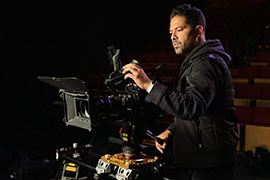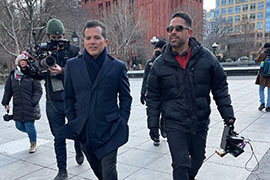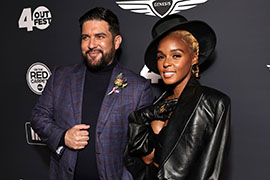- Slug: BC-CNS-Latino Representation,1040.
- 5 photos, graphic available (thumbnails, captions below).
By Daniel Ogas
Cronkite News
LOS ANGELES – Whether it is quinceañeras or Dia de los Muertos, Latinos have plenty of occasions to celebrate. But in recent years, Hollywood has given the community little to praise.
Even as Hollywood execs talk of a changing industry that embraces a diverse landscape of filmmakers and artists, data show Latino acting roles in film and entertainment at large have steadily declined.
Some Latino-driven films have become hits, like biopics “La Bamba,” which celebrated the life of rock ‘n’ roller Ritchie Valens, or “Selena,” about the late Tejano singer Selena Quintanilla-Pérez, but their respective directors didn’t get the subsequent projects that might have been their next hit.
“Latinos, we get one shot, while other directors and other filmmakers get various shots. Somehow we don’t get the same opportunity,” said Luis I. Reyes, author of “Viva Hollywood: The Legacy of Latin and Hispanic Artists in American Film.”
Likewise, Hollywood has produced Latino movie stars like Jennifer Lopez, Eva Longoria, Javier Bardem and others, but they are seldom cast in roles that celebrate their heritage.
One of the most famous Latino stars ever, Anthony Quinn, is best known for playing a non-Latino role as “Zorba the Greek,” a hit movie in 1964. Likewise, Raquel Welch, Martin Sheen and Rita Hayworth all had Latino heritage that was largely unknown to movie audiences.
A study by the Annenberg Inclusion Initiative at the University of Southern California found Latinos are missing from films and television shows.
Latino characters in speaking roles in 1,300 films examined increased in the decade leading up to 2017, when it peaked at 7.2%. However, over the next two years, that number dropped to just under 6%, according to the study. By 2022, a similar report showed that number unchanged.
But Latino representation also fared poorly when it came to content made for streaming services like Netflix, Hulu, and HBO Max: Latinos held 9% of the on-screen roles despite accounting for 19% of the total U.S. population.
Asian and Black actors not only had double-digit representation, but they, along with white actors, all had higher numbers than for their percentage of the population as a whole, found a study by the Latino Donor Coalition via Nielsen.
Despite being poorly represented on big and small screens, Latinos audiences are responsible for 20% to 30% of revenue across the entertainment industry.
“This means that a Latino story is rarely told, and the very few times it is, they are mostly portrayed as drug dealers, criminals, or tied to other negative stereotypes,” the study states.
Latino actors often find they have a tough time trying to find work or lining up top agents who can land them significant roles.
“So many times when searching for management to represent me as an actress, it is really challenging as a Latina,” said Los Angeles-based actress Moriah Garcia, an Arizona State University alumna.
Garcia said her lack of Spanish language fluency has made it harder because she feels she doesn’t fit a stereotype for Latina roles – something white or Black actors wouldn’t encounter. It made it tougher to find a top agent.
“The thought process is, ‘How can I profit off of you?’ If I don’t fit the full stereotype and speak fluent Spanish, they immediately think they won’t get as many gigs with me,” Garcia said. “It makes me feel less Latina.”
Fitting into those stereotypes is something that is very familiar to Latinos across the entertainment industry, and especially resonates with Latinos in the LGBTQ+ community.
“You see your own community struggle to make space for one another,” said Damien Navarro, executive director of Outfest, which bills itself as the world’s largest LGBTQ+ film and media organization. “We can be so fearful that there is not enough to go around.”
Navarro says now that he is at the executive level, he can more easily recognize how Latinos pull together to try to give others a shot at getting a foothold in the industry. He knows his status is a precious tool when it comes to increasing Latino representation throughout the industry.
Creating those stories is something that Ben Dejesus has made a focal point throughout his career.
“From an early age I already could feel the lack of representation,” said Dejesus, partner and president of NGL (which stands for New Generation Latinx) Studios.
Dejesus says he’s disappointed that Latinos have not made big inroads in the movies and TV.
Dejesus says that the low numbers of Latinos across entertainment is a collective missed opportunity, even from a business perspective. With Latinos making up almost a third of audiences but with only relatively few of their stories being told, “it’s a major disconnect,” he said.
Looking toward the future, there is no shortage of optimism that the disconnect can be erased.
Dejesus and actor John Leguizamo have created a partnership through NGL Studios to ensure change.
Most recently, the two were co-creators on “American Historia with John Leguizamo,” which premieres this fall on PBS. The three-part series follows Leguizamo’s efforts to highlight the history and often overlooked contributions of Latino people.
NGL Studios merged with mitú, a leading digital media publisher, to launch a full slate of TV, film and digital content that represents the Latino point of view for universal audiences.
Dejesus said he is inspired by how Cuban-American bandleader and actor Desi Arnaz and wife Lucille Ball hatched a top studio, Desilu, in Hollywood and how, decades later, Tyler Perry created his own sprawling studio complex in Atlanta.
“Our mission is to celebrate the Latino culture in all its colors, shapes, sizes, and to be able to package that in a way that is ready for television audiences,” Dejesus said.
Collectively, the organization sees a better future for Latinos in the business while also contributing to the industry with their own personal attributes.
“We’re moving the needle. These numbers may not reflect what we want, but we are very intentional in how we hire and how we tell the stories,” Dejesus said.
As the industry continues to evolve, a big part of ensuring more Latino representation is by creating stories that fit roles, and are appealing to the community. “If we can’t imagine and create it, then how else do we get there?” Navarro said.
For more stories from Cronkite News, visit cronkitenews.azpbs.org.
^__=
Ben Dejesus working with a camera for a shoot. (Photo courtesy of Espada PR)
Ben Dejesus with John Leguizamo on the set of their project. (Photo courtesy of Espada PR)
Damien Navarro with Janelle Monae. (Photo courtesy of Outfest)
Damien Navarro is executive director of Outfest, which bills itself as the world’s largest LGBTQ+ film and media organization. (Photo courtesy of Outfest)
Ben Dejesus directs a project on set. (Photo courtesy of Espada PR)




